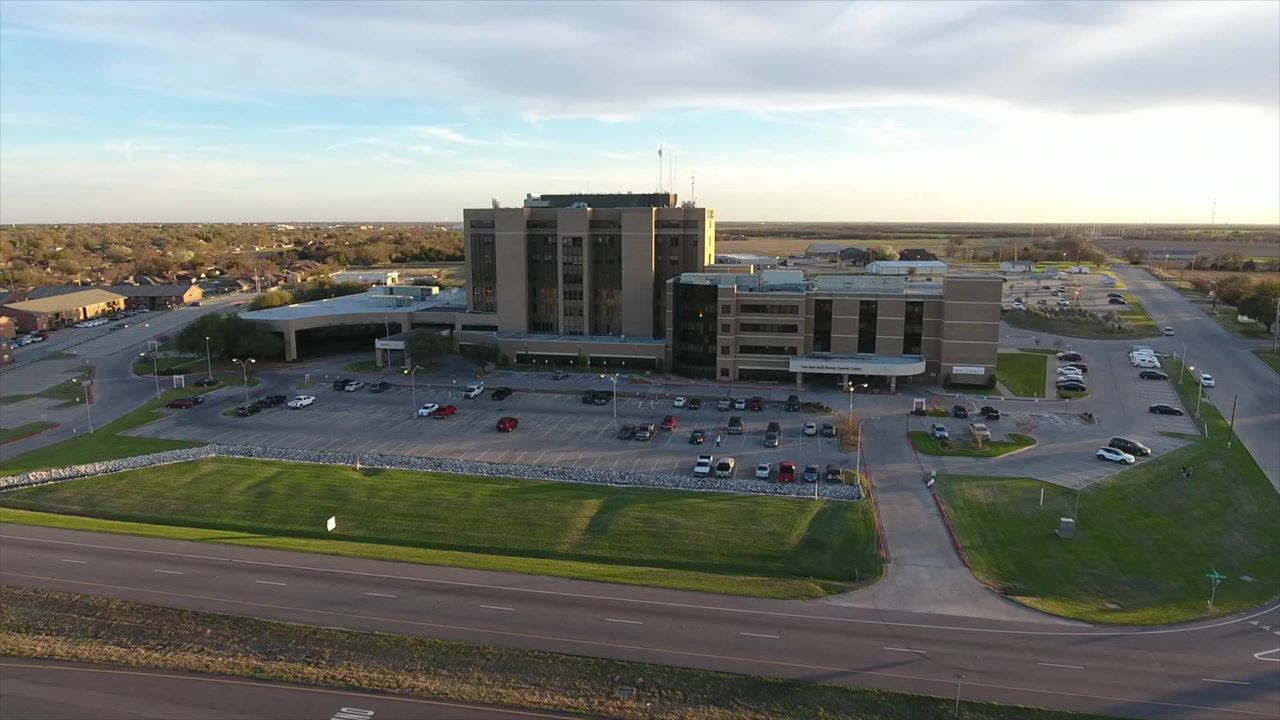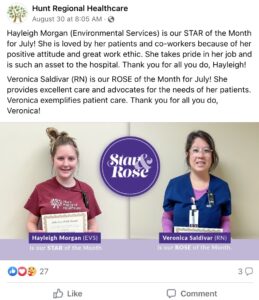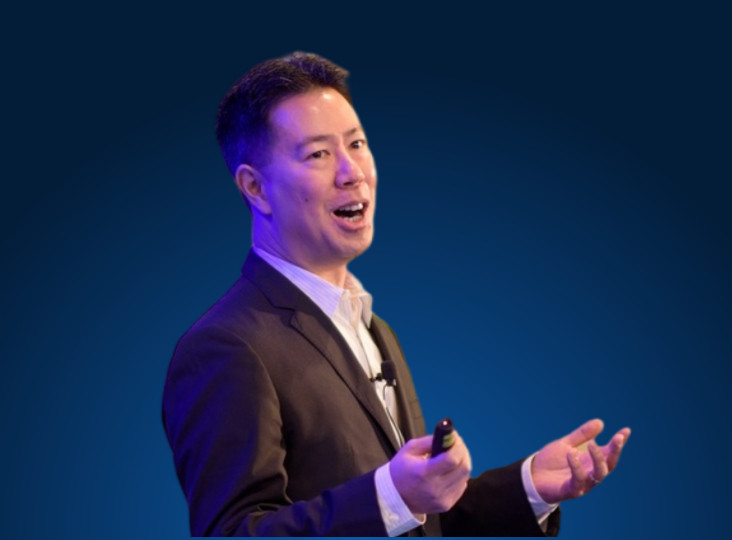Boost engagement and productivity: The advantages of imagining new PX programs

Ever experience the Monday Blues and the sense of dread, apathy, and lack of motivation they bring?
At Hunt Regional Healthcare in Greenville, Texas, they celebrate “Positive Vibe Mondays” by sharing encouraging patient-experience feedback through the organization’s email newsletter. This provides the organization’s employees with a weekly source of motivation and renewed energy to tackle challenges and achieve their daily goals.
“All our nurses, clinical staff, and support team really incorporate our motto, ‘By Your Side,’ into all that we do,” says Vice President of Business Development Travis Potter. “To us, it is who we are, and our patients really feel like they are part of our family, and we see that in the number of touching comments we receive daily. We truly impact patients’ lives with what we do, and our ‘positive vibe’ emails to our staff every Monday align us to our purpose for those in the communities we serve. It’s a great way to start every week.”
Hunt Regional Healthcare, a close-knit, small-town community organization delivering high-quality, cost-effective, and service-oriented care, offers services to prevent, diagnose, and treat the community through its 187-bed regional hospital, with a Level IV trauma center and seven nearby facilities. The healthcare system has also recently extended its primary-care, physical therapy, and urgent-care services and offers service-oriented care programs such as a cardiac catheterization lab, inpatient dialysis, robotic surgery, a Level III NICU, and mobile mammography.
Leveraging New Systems to Understand PX Better
Hunt Regional Healthcare’s leadership says building the positive culture they enjoy today started with a major adjustment from paper to phone surveys for patient feedback.
“Developing a holistic relationship with our patients has always been a core value here at Hunt Regional,” says Jennifer Padilla, Director of Service Excellence. “And making the strategic adjustment to gather information via phone surveys instead of filling out a paper form was something that allowed us to capture a greater percentage of the positive feedback we hear daily, in person with our patients.”
Padilla and Potter wondered if the 27-question handwritten surveys they mailed out were too inconvenient for patients to return. Given our modern culture, they wondered who would take the time to mail back surveys in this day and age—unless they were upset. Ultimately, finding that the handwritten surveys seemed to affect their scores negatively, they switched to phone surveys.
“It was like night and day; our scores changed,” Padilla says. “We found that not only were we getting more positive feedback, but we were capturing patients who were not responding at all before. Previously, in our Women’s Center, we might have gotten 12 to 20 surveys returned by paper, but now we’re getting 60 to 80 by phone. And those patients seem really satisfied, which has helped to increase our scores.”
Padilla says that in addition to the increase in survey responses, Hunt Regional Healthcare’s “Would Recommend” score jumped drastically between March and April, from 55.7 to 62.3. Then, from April to May, it increased from 62.3 to 68.2.
“The improvement in our scores is a reflection of how we changed our system of gathering feedback, but it is also a result of our overall presence in the local communities we serve,” she says. “And I feel like we’ve been providing very good service all along. Now that we have the ability to capture these sentiments more effectively through phone surveys, we can share this positivity throughout the organization.”
Building Award Programs to Build Momentum
Armed with positive feedback, Hunt Regional Healthcare leadership used the post-COVID era of staffing challenges and fast movements as an opportunity to build on the momentum from Positive Vibe Mondays with three award programs for further motivation:
- STAR Cards leverage positive reviews for staff members for above-and-beyond efforts.
- Building on the STAR Cards, the STAR Award recognizes one employee out of 1,500 every month.
- The Rose Award also leverages positive reviews for nurses for a job well done, honoring one nurse out of 1,500 per month.
“Focusing on improving our work environment has impacted those scores more than anything—and it uplifts the attitude at the whole hospital,” explains Reese Hurley, Chief Nursing Officer.
Hurley adds that he likes to send out personalized thank-you cards highlighting specific deeds for staff who have done a job well—and that many recipients are shocked by the gesture. He says he often notifies his CEO when he knows someone has put forth extra effort, so the CEO will talk to or email him or her personally.
“The more we can do that, the more consistent we are with providing a first-class patient experience,” he says. “Our patients are our priority, because they’re like family to us. I think that’s one of the things that makes Hunt Regional unique to this region.”
Lisa Hill, Director of Development and Communications, further leverages the good news in social media and the employee newsletter by routinely posting STAR and ROSE recipients or highlighting an excellent or unique patient comment, which creates a positive ripple effect.
Delivering Unique Ways to Care for Patients
Mobile Mammography: A decade ago, Hunt Regional Healthcare learned that only 37% of women in their county and its surrounding area were getting screening mammograms. With the help of their foundation, they purchased a mobile mammography unit to schedule mammograms at many businesses, schools, churches, civic clubs, or women’s groups, offering $100 cash pricing. The program was so popular, they “drove the wheels off” the first bus, then purchased a brand-new unit. With this program, they have increased mammograms from 37% to more than 60%.
“We’re still working to improve that percentage, but that is one of those service-oriented care programs that targeted a need in our area,” Hill says.
Valet Program: The health system’s main campus launched a complimentary valet parking service at the main entrance, which patients could use Monday through Friday between 7:30 a.m. and 5 p.m. Patients drive to a valet stand under an awning, reducing steps to the entrance and exposure to bad weather. An attendant then provides them with a claim ticket with instructions on how to alert staff when they wish to retrieve their vehicle.
“Cardiac and physical-therapy patients are utilizing the valet the most,” Padilla says. “It’s very helpful to our community.”
Spiritual Care Program: Hunt Regional Healthcare has enhanced its spiritual care program, adding more chaplains and focusing on getting the word out about its 24-hour coverage. There are so many patients who might be going through something difficult and need someone to talk to, Padilla explains, so regardless of their religious or spiritual affiliation, the hospital provides people for them to talk with. It also offers grief support groups.
“If a patient is talking about God, or they want to be spiritual, and they want prayer, then the chaplain will provide that,” Padilla says. “But if they’re just looking for an outlet or an ear, the chaplain provides that too. Our chaplains also provide recognition for events throughout the year, like Ash Wednesday observances or a Christmas service for our staff who are working. They’re not only there for our patients, but also for our staff.”
Advice to Other Healthcare Leaders
Hill believes that having the opportunity to serve a smaller community allows Hunt Regional Healthcare’s leaders to speak regularly to its constituents, enabling grassroots efforts to gather feedback. Having marketing and customer service work closely together to communicate and offer outreach in the community has also helped them develop important community-focused programs.
Ensuring a multi-tiered service-recovery program, where somebody’s always investigating and handling concerns, is critical for Hurley. He also says that daily huddles engaging with case management, department heads, physical therapy, and administration allow them to be more nimble than they once were. He believes that keeping connected to the community’s pulse in order to understand how people view their hospital is paramount.
Padilla feels that the organization’s partnership with NRC Health has allowed them to address initiatives based on feedback metrics and information to understand trends better. She also appreciates resource materials like articles and videos for better physician communication.
“Utilizing NRC Health to assist with the reputation-management transparency ratings, which we tied to the Google ratings for a number of our facilities, has been absolutely fantastic,” Potter adds. “It’s raised our star ratings for all six of those facilities—and not only raised the ratings, but increased the number of reviews, which helps our online reputation tremendously.”
Potter also says that the real-time surveys they’ve added have allowed them to enhance the number of surveys they send out. Earlier, they focused on HCAHPS and their inpatient population, but during the past two years, they’ve added many service lines and gathered feedback from multiple patient populations.
“It’s allowed us to enhance the patient experience across the board, which has been a huge help,” Potter says. “I’ve worked with a few different systems and companies, and I’ll say that NRC Health has been the best to work with. The collaboration with NRC Health has been better than what I’ve seen with others, so in a variety of different ways, NRC has been great to work with and a good partnership.”


